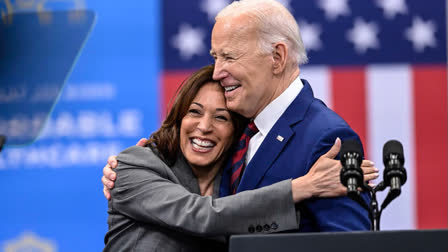Washington: Vice President Kamala Harris moved swiftly to lock up Democratic delegates behind her campaign for the White House after President Joe Biden stepped aside amid concerns from within their party that he would be unable to defeat Republican Donald Trump.
Biden's exit Sunday, prompted by Democratic worries over his fitness for office, was a seismic shift to the presidential contest that upended both major political parties' carefully honed plans for the 2024 race.
Aiming to put weeks of intraparty drama over Biden's candidacy behind them, prominent Democratic elected officials, party leaders and political organisations quickly lined up behind Harris in the hours after Biden announced he was dropping his reelection campaign.
Biden's departure frees his delegates to vote for whomever they choose. Harris, whom Biden backed after ending his candidacy, is thus far the only declared candidate and was working to quickly secure endorsements from a majority of delegates.
Additional endorsements Monday, including Maryland Gov. Wes Moore, Michigan Gov. Gretchen Whitmer, Illinois Gov. J.B. Pritzker and Kentucky Gov. Andy Beshear, left a dwindling list of potential rivals to Harris.
Winning the nomination is only the first item on a staggering political to-do list for her after Biden's decision to exit the race, which she learned about on a Sunday morning call with the president. If she's successful at locking up the nomination, she must also pick a running mate and pivot a massive political operation to boost her candidacy instead of Biden's with just over 100 days until Election Day.
On Sunday afternoon, Biden's campaign formally changed its name to Harris for President, reflecting that she is inheriting his political operation of more than 1,000 staffers and a war chest that stood at nearly $96 million at the end of June. It got bigger by Monday morning: Campaign spokesperson Lauren Hitt said Harris had raised $49.6 million in donations in the first 15 hours after Biden's endorsement.
Harris spent much of Sunday surrounded by family and staff, making more than 100 calls to Democratic officials to line up their support for her candidacy, according to a person familiar with the matter who spoke on the condition of anonymity to discuss the effort. It comes as she tries to move her party past the painful, public wrangling that had defined the weeks since Biden's disastrous June 27 debate with Trump.
Speaking to party leaders, Harris expressed gratitude for Biden's endorsement but insisted she was looking to earn the nomination in her own right, the person said. In a sign that the Democratic Party was moving to coalesce behind her, Harris quickly won endorsements from the leadership of several influential caucuses and political organizations, including the AAPI Victory Fund, which focuses on Asian American and Pacific Islander voters, The Collective PAC, focused on building Black political power, and the Latino Victory Fund, as well as the chairs of the Congressional Progressive Caucus and the Congressional Hispanic Caucus and the entire Congressional Black Caucus. Harris, if elected, would be the first woman and first person of South Asian descent to be president.
Notably, a handful of men who had already been discussed as potential running mates for Harris Pennsylvania Gov. Josh Shapiro, North Carolina Gov. Roy Cooper and Arizona Sen. Mark Kelly also swiftly issued statements endorsing her. Aides to Shapiro and Cooper confirmed that Harris spoke with them Sunday afternoon. In her brief call with Cooper, the North Carolina governor told Harris he was backing her to be the Democratic nominee, according to Cooper spokeswoman Sadie Weiner.
